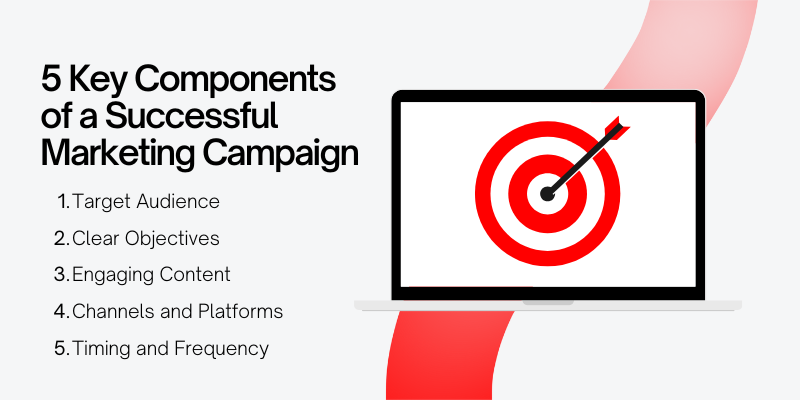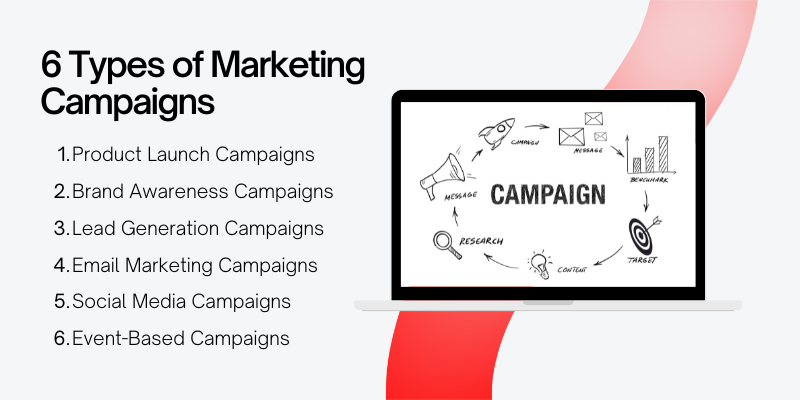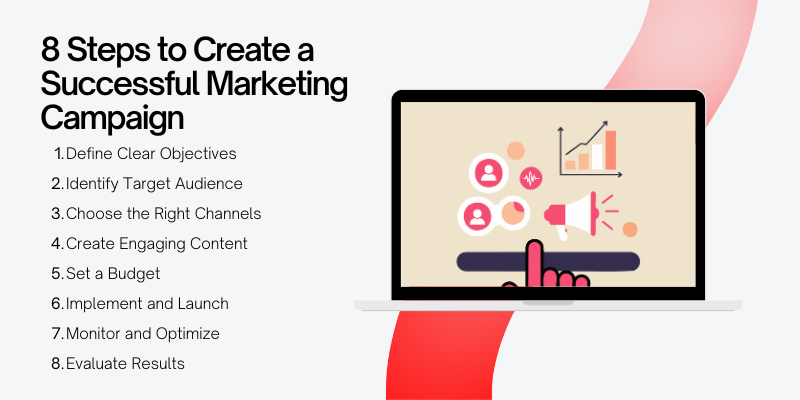Successful marketing campaigns are important for businesses aiming to enhance brand visibility, drive customer engagement, and achieve sustainable growth.
These campaigns serve as the bridge between a company's offerings and its target audience, ensuring that the right message reaches the right people at the right time.
However, the effectiveness of a marketing campaign is not solely dependent on creativity or execution; it is deeply rooted in strategic planning.
Strategic planning provides a clear roadmap, aligning marketing efforts with overarching business objectives.
It involves analyzing market trends, understanding consumer behavior, and setting measurable goals to guide campaign activities.
Without a solid strategic foundation, even the most innovative campaigns can falter, especially when automated queries aren't properly understood, or when how to turn off Google AI is not implemented effectively.
Therefore, integrating meticulous strategic planning with precise execution is essential for the success of any marketing campaign.
In this blog, we delve into how strategic planning and execution form the backbone of successful marketing efforts, ensuring growth and brand success.
4 Most Successful Marketing Campaigns That Set New Industry Standards
Certain successful marketing campaigns have not only achieved commercial success but have also redefined industry practices, setting new benchmarks for creativity, engagement, and impact, much like Master Data Management Best Practices reshape data-driven strategies.
These campaigns have become case studies in innovation, influencing how brands approach storytelling, audience interaction, and cross-platform integration, similar to how What Is Commercial Real Estate influences investment and development strategies, including strategies like what are automated queries for optimized performance.
Here are four standout examples of successful marketing campaigns that have left a lasting impact:
1. Shell: "Expect More from Shell Fuels" (2024)
Shell launched the “Expect More from Shell Fuels” campaign in India to promote its new fuel range.
The campaign highlighted the next-generation deposit-targeting technology that removes harmful deposits, protects engine condition, and delivers up to 15 kilometers more per tank.
The campaign was based on extensive consumer research to understand perceptions and expectations of the category and the brand.
2. Josh Horner’s Viral Property Ad (2025)
Australian real estate agent Josh Horner gained widespread attention with a theatrical promotional video for a $3 million estate in Wamberal.
The video featured Horner in various personas, including an Indiana Jones-style adventurer and a cabaret dancer, creatively highlighting the property's features.
3. Dunkin’s "Shake That Ess" Campaign (2024)
Dunkin' partnered with singer Sabrina Carpenter to introduce the Brown Sugar Shakin' Espresso, accompanied by a playful ad featuring Carpenter.
The campaign also included a limited-time $5 breakfast meal deal, aiming to attract budget-conscious customers.
4. Coqodaq’s US Open Presence (2024)
Coqodaq executed strategic brand placement at the US Open by offering exclusive VIP dining experiences for tennis fans and celebrities.
The campaign's standout feature was its unique packaging, which deviated from the usual fast-food presentation, enhancing brand engagement.
5 Key Components of Successful Marketing Campaigns
A successful marketing campaign hinges on several critical components that ensure its effectiveness and alignment with business objectives.

Digital marketing plays an essential role in reaching and engaging the target audience through various online platforms, such as social media, search engines, and email marketing. A strong digital marketing strategy is crucial for maximizing reach and ensuring that campaign messages are delivered effectively.
Here's an overview of these key elements:
1. Target Audience
Identifying and understanding your target audience is paramount. This involves segmenting the market based on demographics, psychographics, and behavioral traits to create detailed buyer personas. Such segmentation allows for tailored messaging and content that resonates with specific audience segments, enhancing engagement and conversion rates.
2. Clear Objectives
Establishing clear, measurable objectives provides direction and purpose to the campaign. Utilizing the SMART criteria—Specific, Measurable, Achievable, Relevant, and Time-bound—ensures that goals are well-defined and attainable. These objectives guide strategy development and serve as benchmarks for evaluating campaign success.
3. Engaging Content
Content is the cornerstone of any marketing campaign. It should be compelling, relevant, and aligned with the interests and needs of the target audience. A mix of content types, such as blog posts, videos, infographics, and social media updates, can be employed to maintain engagement and convey the campaign message effectively.
4. Channels and Platforms
Selecting the appropriate channels and platforms is crucial for reaching the target audience. This decision should be based on where the audience is most active and the nature of the content being shared. A multi-channel approach, integrating both online and offline platforms, can maximize reach and impact.
5. Timing and Frequency
The timing and frequency of campaign activities influence their effectiveness. Strategic scheduling ensures that the campaign reaches the audience at optimal times, increasing the likelihood of engagement. Consistent messaging and appropriate frequency help in reinforcing the campaign's message without overwhelming the audience.
Explore Our Oil & Gas Marketing Services!
6 Types of Marketing Campaigns
Successful Marketing campaigns are strategic efforts designed to promote a brand, product, or service, aiming to achieve specific objectives such as increasing sales, enhancing brand awareness, or engaging with a target audience.

Creative Campaign Services play a crucial role in developing innovative strategies that capture attention and drive results, ensuring that campaigns are not only impactful but also align with brand goals.
The effectiveness of a campaign often depends on its type, each serving distinct purposes and utilizing various channels. Performance marketing focuses on measurable results, such as clicks, conversions, and other key performance indicators (KPIs), ensuring that marketing spend is directly tied to specific outcomes.
This data-driven approach allows businesses to optimize their campaigns in real-time for better ROI.
Here's an overview of several key types of marketing campaigns:
1. Product Launch Campaigns
These campaigns focus on introducing a new product to the market, creating buzz and excitement among potential customers. They often include teasers, exclusive previews, and special promotions to generate interest and drive initial sales. For businesses looking to streamline their efforts, Product Launch & Execution Services can help ensure a smooth and impactful launch, guiding the product from concept to consumer.
2. Brand Awareness Campaigns
The goal here is to increase recognition and visibility of a brand among its target audience. Such campaigns often utilize consistent messaging across various platforms to build familiarity and trust with consumers.
3. Lead Generation Campaigns
These campaigns aim to attract and capture potential customer information, typically through offers like free trials, downloadable content, or newsletters. The focus is on building a database of prospects for future marketing efforts.
4. Email Marketing Campaigns
Utilizing email as a direct communication channel, these campaigns can include newsletters, promotional offers, or personalized messages to engage with subscribers and encourage desired actions. Email Marketing is a powerful tool for businesses looking to connect directly with their audience, delivering targeted content that resonates with each subscriber.
5. Social Media Campaigns
Leveraging platforms like Facebook, Instagram, and Twitter, these campaigns aim to engage users through interactive content, contests, or influencer partnerships, fostering community and brand loyalty.
6. Event-Based Campaigns
These campaigns are centered around specific events, such as product launches, trade shows, or seasonal promotions. They aim to capitalize on the event's momentum to boost brand visibility and customer engagement.
Explore Our Creative Campaign Services!
8 Steps to Create Successful Marketing Campaigns
Crafting a successful marketing campaign involves a structured approach to ensure alignment with business objectives and effective audience engagement.

Below is a comprehensive guide detailing each step:
1. Define Clear Objectives
Begin by setting specific, measurable, achievable, relevant, and time-bound (SMART) goals. These objectives should align with your overall business strategy and provide a clear direction for the campaign. For instance, aiming to increase website traffic by 30% within three months or generating 500 new leads through a targeted email campaign.
2. Identify Target Audience
Understanding your audience is crucial. Develop detailed buyer personas that encompass demographics, behaviors, preferences, and pain points. This segmentation allows for tailored messaging and content that resonates with specific audience groups, enhancing engagement and conversion rates.
3. Choose the Right Channels
Select platforms that best reach your target audience. This could include social media, email newsletters, paid advertising, or content marketing. Consider the strengths of each channel and how they align with your campaign objectives. For example, leveraging Instagram for visual products or LinkedIn for B2B services.
4. Create Engaging Content
Develop content that captivates and informs your audience. This includes crafting compelling headlines, informative blog posts, engaging videos, and eye-catching graphics. Ensure the content is consistent with your brand voice and provides value to the audience, prompting them to take desired actions.
5. Set a Budget
Allocate resources effectively by determining a budget that supports all aspects of the campaign, including content creation, advertising spend, and tools. Monitor expenditures to ensure the campaign remains cost-effective and delivers a positive return on investment.
6. Implement and Launch
Execute the campaign according to the planned schedule. Ensure all team members are aligned with their responsibilities and timelines. Utilize automation tools where applicable to streamline processes and maintain consistency across channels.
7. Monitor and Optimize
Track key performance indicators (KPIs) such as click-through rates, conversion rates, and engagement levels. Use analytics tools to assess performance and identify areas for improvement. Be prepared to make adjustments in real-time to enhance effectiveness.
8. Evaluate Results
After the campaign concludes, conduct a thorough analysis to assess whether objectives were met. Review the data to understand what worked well and what could be improved. This evaluation provides valuable insights for refining future campaigns and strategies.
3 Common Mistakes to Avoid in Marketing Campaigns
Even the most well-intentioned marketing campaigns can falter if certain pitfalls are not avoided.
Here are some common mistakes to watch out for:
1. Failing to Segment the Audience Correctly
Effective segmentation is crucial for targeting the right audience with the right message. Mistakes in segmentation can lead to irrelevant messaging, wasted resources, and missed opportunities.
2. Ignoring Data Analysis and Optimization
Data-driven decisions are key to refining marketing strategies. Neglecting to analyze campaign performance can result in continued inefficiencies and missed opportunities for improvement.
3. Inconsistent Messaging Across Different Platforms
Consistency in messaging across various platforms builds brand recognition and trust. Inconsistent messages can confuse the audience and dilute brand identity.
Conclusion
Creating a successful marketing campaigns involves defining clear objectives, understanding your target audience, selecting appropriate channels, crafting engaging content, setting a realistic budget, and continuously monitoring and optimizing performance. It's essential to stay informed about industry trends and adapt strategies accordingly to maintain relevance and effectiveness. Partnering with experienced professionals like Centric can help businesses design data-driven campaigns that achieve measurable results. Regular evaluation and adjustment ensure that campaigns remain aligned with business goals and resonate with the audience, ultimately driving sustained success.








